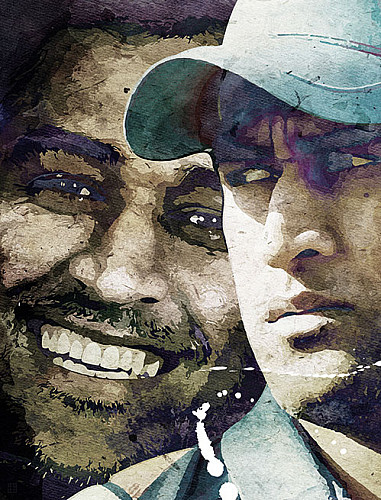Why Mahendra Singh Dhoni Is India’s Most Innovative Cricketer
Fatherhood makes people do strange things. An alpha male shows no hesitation in carrying a man purse. An intensely private person doesn’t object to personal interactions being broadcast on social media. A man who has long suspected the futility of the rat race embraces the idea that achievement is essentially an illusion, as useful as it may be in earning fame and wealth. MS Dhoni seems to have discovered much joy — and a softer side — in fatherhood, using all his spare time on the IPL trail to bond with daughter Ziva. For a man otherwise obsessed with motorbikes, fighter jets and the armed forces, Dhoni seems just as ready now to discuss baby food, colic and the terrible twos. Perhaps, there’s no real surprise here. His roots may lie in the chauvinistic crannies and nooks of Ranchi, but the most influential figures in his life have been women he would describe as smart and strong: his mother Devaki Devi, sister Jayanti and wife Sakshi.
Will he ever be as loved as Sachin Tendulkar? Unlikely. Will he ever be as highly regarded a batsman as Virat Kohli? Surely not. Can he be considered India’s most innovative and unusual cricketer, on and off the field? Almost certainly.
Of the superstar triumvirate that stalks the Indian imagination in cricket’s hyper-modern era, Tendulkar was the Master Accumulator, Kohli the Ultimate Chaser and Dhoni the Supreme Innovator. Whether it’s the karate-kick manoeuvre to stop batsmen from running the ball down to third man for a quick single, running up to the stumps even as the bowler delivers the ball for a quick run-out or, indeed, creating stumping chances out of thin air, Dhoni has been exceptionally inventive as wicketkeeper. As batsman, he has been athletic, cheeky and tenacious, using steely forearms to whisk the ball for his trademark helicopter stroke, and routinely finishing off games with sixes to claim the title as the best finisher in the business. But it is as captain that we get a true sense of his character. Resourceful and imaginative, he places immense faith in his instinct and cricketing nous to take unconventional calls. Most of all, he is unflappable under pressure, a task at which men greater than him have failed. His record as India’s most successful captain speaks for itself.
Among his most admirable qualities as leader is his willingness to face the press when India has been unsuccessful. Often, on days when India won, Dhoni would stay away from the limelight, sending in the star performer instead to interact with the media. He disappeared after India won the 2011 World Cup, choosing not to hog the credit or bask in the glory of a long-awaited World Cup win, and again when he quit Test cricket in a heartbeat during India’s tour of Australia in 2015. But on days India loses, and there are inevitably tough questions, there he is: admitting his failures, being honest about his team’s weaknesses. Most of all, he is willing to take the blame, as he did most recently when the Rising Pune Supergiants — his new IPL franchise after the Chennai Superkings were suspended on corruption charges — were on a losing streak in the latest edition. His second most admirable attribute as captain is his ability to switch off after office hours, a quality Tendulkar discovered he did not possess during his two stints in charge.
Dhoni has taken more than a few sips from cricket’s holy grail: taking India to World Twenty20 glory, the number one spot in the Test rankings and, most memorably of all, the 2011 World Cup title. And yet, you sense he will fill the gaping hole post-retirement quite easily. Could a political career be in the offing? It would not be surprising. In conversations with him, it is clear he does not blindly chase the trappings of success, but he knows what it can do for a small-town boy from cricket’s boondocks: the love (however fleeting) of a billion fans, the attention of Bollywood’s leading ladies (and gents), a mansion in Ranchi named Shaurya (‘bravery’ in Hindi), and rubbing shoulders with political and business high and mighties. But he is just as aware of the many downsides of life in the spotlight, as the broken glass panes on his mansion — the result of an attack by disappointed fans — will testify.
But if one is interested in an honest appraisal of the man, then tough questions must be asked — and have been. Was he dishonest about Gurunath Meiyappan’s role (as owner of the Chennai Superkings) to the Justice Mudgal committee, constituted to investigate wrongdoing in the IPL? Possibly. Was he upfront about his connection with Rhiti Sports Management — a player management agency run by close friend Arun Pandey — in which he was said to have a stake before the conflict of interest was pointed out? Not particularly. Did he hold on to Test captaincy and a place in the team longer than he should have, especially since he made no secret of the fact that he finds the longest form of the game boring? Most definitely. He may be India’s greatest captain, but — and there has to be a but — his journey from the backwaters of cricket to the pinnacle of the sport has as much to do with knowing how to play the game (and I’m not talking about cricketing skills here) as with the pure love of the sport. Make no mistake, there were plenty of sweat and tears, and his success is his alone. But his open-armed embrace of the India Cements vice presidency (a company owned by former BCCI president N Srinivasan) and reluctance to distance himself from Srinivasan once questions had been asked about his probity do raise doubts about Dhoni’s schmoozing of those in power.
Then again, there’s every chance he would provide perfectly good reasons for all his questionable decisions. This is not a man preoccupied with self-doubt. Once it was clear that the politicking and pettiness that seem embedded in every aspect of life in Bihar and UP had not left cricket untouched — Dhoni was not informed by his own cricket association that he was picked to represent the East Zone in the 2001 Duleep Trophy — he knew he would have to possess the smarts to outwit, or befriend, the power brokers who run cricket in this country.
This meant leaving behind the under-confident teenager who had doubts about his attractiveness. It involved investing in Rolex watches in the search for self-validation, proving to himself, and himself alone, that he had ‘made it’. It meant making his disagreements with certain players obvious to the press, at the cost of damaging those relationships for good. It has also involved mocking the press to make a point if he feels cornered, most recently witnessed in his exchanges with Indian and Australian journalists who asked tough questions. The first one he nearly accused of being anti-national, as though the press must beat the drum of jingoism. The second, who asked about retirement plans, he invited to share the stage with him and make a song and dance about a simple — and fair — query. But this is not a man who spends hours agonising and introspecting about how he could have done things differently, or how he could be a better leader. Or, indeed, a better man.
And that is fine. We expect too much of our heroes, particularly our sporting heroes. We expect them to stand testament to a higher degree of morality than we ourselves are willing to employ. They lie, avoid taxes, indulge in extramarital affairs, drink and drive, smoke, and wear many masks to get through the suffocating challenge of living life under microscopic scrutiny. They are just as deeply flawed as the rest of us. And Mahendra Singh Dhoni is no exception. The best part? He doesn’t for a moment pretend otherwise.
Related posts from Verve:
Verve Trending
Sorry. No data so far.
us on Facebook to stay updated with the latest trends






